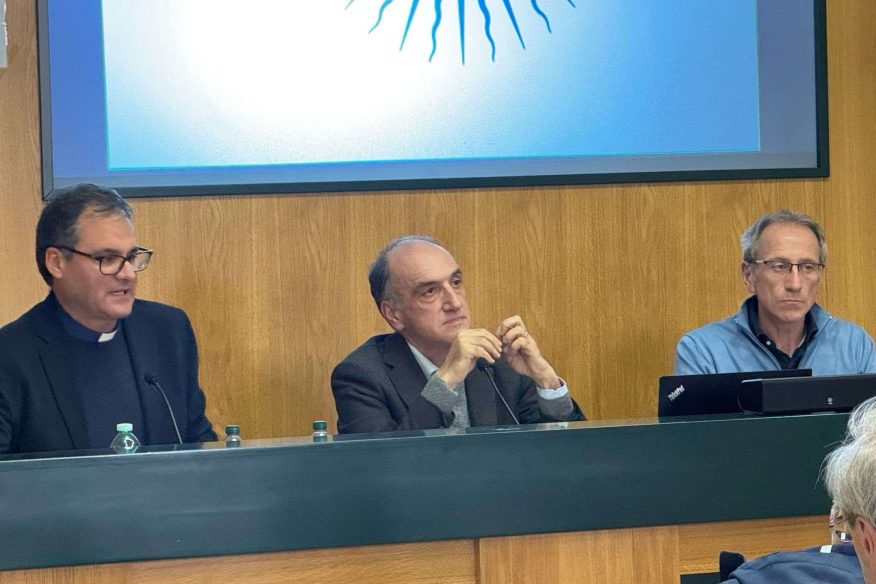The core of Jesuit Education

The spotlight is on Ignatian schools, the proposal, the educational method. But what does it mean to study with the Jesuits? A reflection on Ignatian pedagogy by Fr Eraldo Cacchione SJ, head of school pastoral work at the Fondazione Gesuiti Educazione.
Ignatian education, or Jesuit education, is a form of education that places the person at the centre: both the person of the teacher and the person of the student, each with their own contribution. In fact, therefore, it is an education that proposes a ‘personal encounter’ which triggers, so to speak, paths of academic, human and spiritual growth through a broad and articulated series of cognitive and affective inputs, individual and communal, that work in depth. As far as the student is concerned, living an Ignatian education to the full enables him/her to gradually become aware that he/ she is more than gifted by God with talents that make him/her a person “of value”, and aware that he/she is fully adequate to take an active part in adult life, in a community where he/she can be of service for and with others, giving him/her competent, conscious, compassionate, faith-filled and justice-loving contribution.
From its origins to today
Initially the emphasis of Ignatian education was on carrying out a curriculum that was entirely ‘our own’. It was the Ratio Studiorum, that is the result of the elaboration of the heritage of Christian Humanism (a Renaissance synthesis of the Christian tradition and the classics of Latinity and Greekity, integrated with a philosophical passion for science, linguistics and a concern for ‘peformance’ through theatre, dance and music) articulated by groups of Jesuits from different parts of the world into a school system for a society that no longer exists: schools with not very high numbers of students (in many cases even ‘insiders’), educating communities formed practically only or almost only by Jesuits who were present at school to teach the children in Latin, morning and afternoon six days a week. After the French Revolution, with the birth of the nation-states, each nation adopted a system of education for all, with a state-controlled school curriculum in the language of that state. This made the curriculum of Jesuit schools no longer ‘unitary’, creating an enormous variety of Ignatian educational institutions. On the other hand, Jesuit education has become inculturated in every part of the globe, with a common core and many differences due to local cultures and the demands of state curricula. Moreover, in the latter part of the 20th century, the reduced number of religious vocations made the direct contribution of Jesuit fathers less (and sometimes minimal), favouring the arrival of lay people trained in Ignatian spirituality and pedagogy, and changing both the approach to the school curriculum and the shape of the educating community.
The core
I believe that the “common core” that remains over time, almost like a “stamp” or a “signature” of Ignatian education, is the following: an education that sees the curriculum and the academy not as an end but as a means, and the person of the student to be “educated” (and not just “instructed”) as the heart of every formative process that takes place in our schools. All this emerges clearly in the definition I gave earlier. Another factor that in my opinion constitutes the “sign” of Ignatian education is the enormous amount of time and energy devoted by those who educate to the children: Ignatian education is not exhausted in the school hours spent in the mornings in the classroom, but also has as an integral part the afternoons, Saturdays, Sundays, formative outings, participation in Christian formation groups or other activities (sports, music…). All these activities are intentionally conceived as educational opportunities, and all of them contribute to the ” formation of the whole person”… All this requires an enormous amount of time on the part of the educators, so much so that the educator in fact gives himself/herself to the student, and it is precisely through this “excess of giving” that a life-giving personal relationship is created, which makes the journey made by the students in our educational institutions unique. In the end, it is the time spent together, it is the friendship generated and cemented in the hours, days, weeks of “educational time” what makes Ignatian/Jesuit education “Ignatian”, or “Jesuit”.
This sign transpires in a “social” attitude towards knowledge, that remains deeply embedded in the person of the past student after the school years in a Jesuit school: knowledge, which has become a “flavour” through the countless opportunities for discussion and dialogue among peers and with educators, ceases to be conceived as an individual good and becomes rather a “social” good to be put at the service of others.
Eraldo Cacchione SJ
